 W
WAmerican Psycho is a novel by Bret Easton Ellis, published in 1991. The story is told in the first person by Patrick Bateman, a serial killer and Manhattan investment banker. Alison Kelly of The Observer notes that while "some countries [deem it] so potentially disturbing that it can only be sold shrink-wrapped", "critics rave about it" and "academics revel in its transgressive and postmodern qualities".
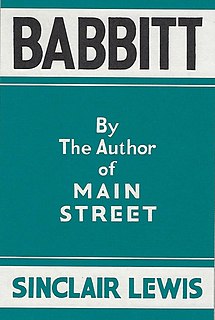 W
WBabbitt (1922), by Sinclair Lewis, is a satirical novel about American culture and society that critiques the vacuity of middle class life and the social pressure toward conformity. The controversy provoked by Babbitt was influential in the decision to award the Nobel Prize in Literature to Lewis in 1930.
 W
WBrave New World is a dystopian social science fiction novel by English author Aldous Huxley, written in 1931 and published in 1932. Largely set in a futuristic World State, whose citizens are environmentally engineered into an intelligence-based social hierarchy, the novel anticipates huge scientific advancements in reproductive technology, sleep-learning, psychological manipulation and classical conditioning that are combined to make a dystopian society which is challenged by only a single individual: the story's protagonist. Huxley followed this book with a reassessment in essay form, Brave New World Revisited (1958), and with his final novel, Island (1962), the utopian counterpart. The novel is often compared to George Orwell's Nineteen Eighty-Four.
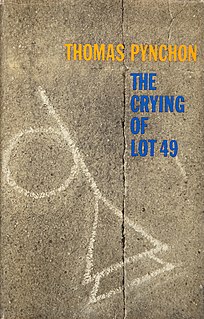 W
WThe Crying of Lot 49 is a novel written by American author Thomas Pynchon and published in 1965. The shortest of Pynchon's novels, its narrative follows Oedipa Maas, a young Californian woman, who begins to embrace a conspiracy theory as she possibly unearths a centuries-old conflict between two mail distribution companies; one of these companies, Thurn and Taxis, actually existed (1806–1867) and was the first private firm to distribute postal mail. Like most of Pynchon's output, Lot 49 is often described as postmodernist literature. Time included the novel in its "TIME 100 Best English-language Novels from 1923 to 2005".
 W
WEpiphany Jones is the debut novel by Michael Grothaus published in June 2016. The novel is a literary thriller, social satire, and dark comedy about America's obsession with sex, celebrity, and the internet, which explores a pornography addict’s unwilling relationship with a woman who thinks she can speak to God and their entanglement with sex traffickers that cater to the Hollywood elite. Grothaus has stated that his personal experiences at the Cannes Film Festival and his disillusionment with the Hollywood film industry were strong inspiration for the novel.
 W
WEveryone in Silico is a 2002 post-cyberpunk novel written by Jim Munroe. It was promoted partly by Munroe's attempt to invoice corporations mentioned in the novel for product placement. The title is an intentional reference to an advertising campaign previously run by clothing retailer Gap, one of the companies Munroe sent invoices to.
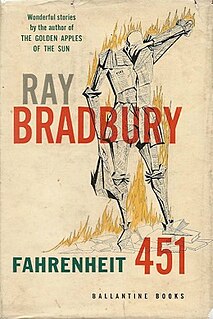 W
WFahrenheit 451 is a 1953 dystopian novel by American writer Ray Bradbury. Often regarded as one of his best works, the novel presents a future American society where books are outlawed and "firemen" burn any that are found. The book's tagline explains the title as "'the temperature at which book paper catches fire, and burns": the autoignition temperature of paper. The lead character, Guy Montag, is a fireman who becomes disillusioned with his role of censoring literature and destroying knowledge, eventually quitting his job and committing himself to the preservation of literary and cultural writings.
 W
WFight Club is a 1996 novel by Chuck Palahniuk. It follows the experiences of an unnamed protagonist struggling with insomnia. Inspired by his doctor's exasperated remark that insomnia is not suffering, the protagonist finds relief by impersonating a seriously ill person in several support groups. Then he meets a mysterious man named Tyler Durden and establishes an underground fighting club as radical psychotherapy.
 W
WGlamorama is a 1998 novel by American writer Bret Easton Ellis. Glamorama is set in and satirizes the 1990s, specifically celebrity culture and consumerism. Time describes the novel as "a screed against models and celebrity."
 W
WInfinite Jest is a novel by American writer David Foster Wallace. The novel has an unconventional narrative structure, including 388 endnotes, some with footnotes of their own.
 W
WJ R is a novel by William Gaddis published by Alfred A. Knopf in 1975. In the story, a schoolboy secretly amasses a fortune in penny stocks. J R won the National Book Award for Fiction in 1976. It was Gaddis' first novel since the 1955 publication of The Recognitions.
 W
WJennifer Government is a 2003 dystopian novel by Max Barry, set in an alternate reality where most nations in the Americas and Oceania are dominated by powerful corporations and corporate coalitions, and where government power is extremely limited. It was a finalist for a Campbell Award in its year of eligibility, but did not win, and was included in The New York Times' annual list of notable books. The novel was retitled from Jennifer Government to Logoland in its German and Italian editions. In its Brazilian edition it was retitled to EU S/A, an abbreviation of Estados Unidos Sociedade Anônima, which roughly translates to United States, Inc.
 W
WKingdom Come is a 2006 novel by the British writer J.G. Ballard. It is the last novel written by him before his 2009 death.
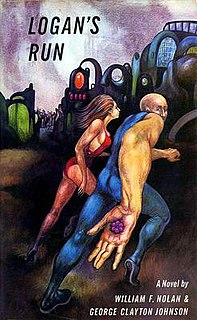 W
WLogan's Run is a novel by William F. Nolan and George Clayton Johnson. Published in 1967, the novel depicts a dystopic ageist future society in which both population and the consumption of resources are maintained in equilibrium by requiring the death of everyone reaching the age of 21. The story follows the actions of Logan, a Sandman charged with enforcing the rule, as he tracks down and kills citizens who "run" from society's lethal demand—only to end up "running" himself.
 W
WMala onda is a Chilean Bildungsroman novel and social commentary by Alberto Fuguet. It is also Fuguet's debut novel, first published in 1991.
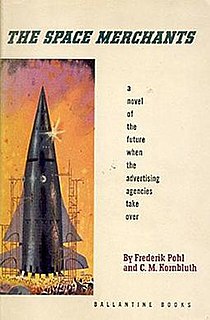 W
WThe Space Merchants is a 1952 science fiction novel by American writers Frederik Pohl and Cyril M. Kornbluth. Originally published in Galaxy Science Fiction magazine as a serial entitled Gravy Planet, the novel was first published as a single volume in 1953, and has sold heavily since. It deals satirically with a hyper-developed consumerism, seen through the eyes of an advertising executive. In 1984, Pohl published a sequel, The Merchants' War. In 2012, it was included in the Library of America omnibus American Science Fiction: Four Classic Novels 1953–1956. Pohl revised the original novel in 2011 with added material and more contemporary references.
 W
WSyrup is a novel written by Max Barry under the pseudonym Maxx Barry, which satirizes consumerism and marketing techniques. It is Barry's debut novel, published in 1999, and adapted into the 2013 film Syrup.
 W
WThin Air is a dystopian cyberpunk military science fiction novel by Richard K. Morgan first published in 2018. Set in the same reality as his 2007 novel Black Man, it is set "well over a century" later than the earlier novel, with all the action taking place on Mars, whereas Black Man / Thirteen is set on Earth.
 W
WThings is a 1965 novel by Georges Perec, his first.
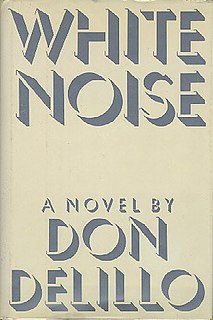 W
WWhite Noise is the eighth novel by Don DeLillo, published by Viking Press in 1985. It won the U.S. National Book Award for Fiction.